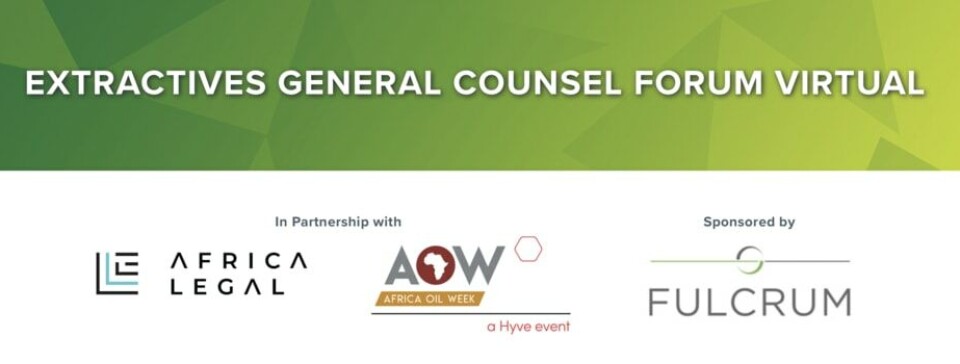Copyright : Re-publication of this article is authorised only in the following circumstances; the writer and Africa Legal are both recognised as the author and the website address www.africa-legal.com and original article link are back linked. Re-publication without both must be preauthorised by contacting editor@africa-legal.com
Take the Community With You

One of the big events of the Africa Legal calendar is the Extractives GC Forum. The event was held online last week and focussed on the extractives sector. Annie Dorasamy followed the discussion and, here, gives a summary of some of the discussion from day one.
The Extractives General Counsel Virtual Forum, held this week and hosted by Africa Legal and Hyve Plc, has enabled those providing legal services within their organisations to become key influencers, controllers and stakeholders, despite the seismic changes in society.
Sponsored by Fulcrum, the event focused on the role of in-house general counsel in the mining, oil, gas, energy and renewables sectors.
Co-chaired by Jacqueline Musiitwa, Founder and Director of Kalene Hill Resources, discussions on day one centred on the ‘ties that bind’ the extractive sectors in Africa, handling the disclosure burden when it comes to Environmental Social Governance (ESG), its impact on communities as well as the financing of green and sustainable operations.
Panelists shared their experiences of working in the various extractives sectors and how to create a better synergy among the various sectors, including local communities.
It was apparent that the role of in-house general counsel has evolved over the years and that being transparent was the way forward when it comes to ESG.
Frans Baleni, Chairman of Petro SA and Former General Secretary of the National Union of Mineworkers, spoke about how natural resources can be viewed as both a curse and an opportunity. He compared his experience of how a mine in Sweden, where he had spent time, gained the full support of the community.
“The relationship with the community there is amazing, even when they are required to move because the mine was expanding. Almost 100% of them agreed and they can relate how the mine has changed their lives over time”.
He then compared the situation to Africa, where the reactions from communities were mixed.
“The Democratic Republic of Congo ( DRC) is one of the poorest countries and yet endowed with exceptional natural resources, diamonds, cobalt, copper hydro power,” said Frans.
He said communities were angry because they remained in poverty, while mining companies benefited. However, in areas where the locals could see tangible changes to their lives, they were more co-operative.
Frans said the role of in-house legal counsel should be a long term relationship with the stakeholders in countries in which they operate.
Daniel Driscoll, Vice-President Legal and Compliance, Endeavour Mining, who moderated the first session, agreed with Frans and said extractive companies and host nations were partners in bringing the various resources to the market. He said, in return, it was important to ensure local communities benefit.
The second session looked into the issue of transparency, which was critical for ESG.
The variety in the amount of disclosure requirements for the extractive centre has grown considerably in recent years, in addition to traditional financial disclosures, considering new tax disclosures and ESG, which is critical.
Alissa Eason, Vice President and Associate General Counsel - Legal & Contracts, at Kosmos Energy, said being transparent was more than just declaring how much taxes we pay locally or what organisations we are working with at a local level.
“Everything we do is driven by a theory of transparency.”
Erica Westenberg, Governance Programmes Director at the Natural Resource Governance Institute, said issues such as corruption could threaten climate success.
“The actual underlying concerns around climate and governance and anti corruption and tax and financial equity are intercepting and, for companies, what that means is that you have to be more proactive rather than reactive in terms of developing strategies to demonstrate accountability on these issues. It also has to mean breaking down some of the internal corporate silos between the different units and areas of expertise as these lines get more and more joined up” .
The panellists agreed that transparency from all stakeholders was a commercial advantage.
To view the on-demand recording of the Extractives GC Forum simply complete the registration form at the bottom of the event website.
To join Africa Legal's mailing list please click here
